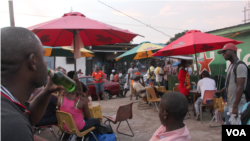Almost seven months into the worst Ebola outbreak ever, Liberia is in the tight grip of the disease. One of the least talked about aspects of the Ebola crisis is that is has taken away physical interaction between people. During a tragic time, affection and physical comfort are off limits.
With an 11 pm curfew, Monrovia’s nightclubs and entertainment centers open much earlier these days. That is why you can hear loud music at Exodus bar at 6 pm on a Saturday night. Inside, people sit quietly around tables. Nobody is dancing.
One partygoer said he wore long sleeves because he’s afraid of getting Ebola. The deejay regularly reminds people of the risks through his microphone: “Well, Ebola is real. It’s here in Liberia.”
Even though it’s not much fun going to nightclubs anymore, Monrovians keep coming. Viviane Gambah sits outside next to the club on a terrace and has beers with her girlfriends.
“Today I just left my house because sometimes when we sit and think on this Ebola issue, we feel bad. And sometime we really don’t know what to do. I just decided to come out and drink two or three bottles and go and sleep. But really, I don’t dance,” said Gambah.
Liberians are literally awash in chlorine and Ebola, 24 hours a day, seven days a week. Ebola is on posters, on TV, on the radio, in the paper.
And any body contact seems risky. Liberians do not hug, backslap or shake hands when they meet. Street vendors have a hard time selling snacks -- except for things like oranges and kola nuts, because they can be washed with chlorine before eating.
It is all taking a deep emotional toll on everyone - most especially health workers and Ebola patients.
Bangalie V. Kamara, who works as a physician’s assistant at the Doctors Without Borders Elwa 3 Ebola management center in Monrovia, said his job has caused a strain on his 15-year marriage.
“In fact, she once told me that if I continue working there, I have to rent a different place where I will be isolated from the family,” said Kamara.
He said eventually he was able to calm his wife’s fears. But there are other pressures, such as parents not allowing their children to play with his daughter.
A psychologist at the Elwa 3 center said Ebola patients and survivors, especially children, suffer most. Despite being healed, their communities shun them.
Ebola even sets apart those who do not deal directly with the virus, like Jamal Williams and his younger brother Isaiah. Both are in their early 20s with steady girlfriends. Jamal said Ebola is robbing them of intimacy.
“When she is at home or when she leaves home… I’m not aware of her well-being. So, I’m home too. She does not know who I interact with. So I just encouraged her not coming around me and touching me. It’s better that we stay away from each other until we see a calm-down in this Ebola situation,” said Jamal.
The two brothers were separated by the civil war in 1994 and did not know each other’s whereabouts for about nine years. After Ebola, Jamal said, people need to reconcile like they did after the war. Jamal noted the story of a friend whom, because of Ebola, he currently avoids.
“Somebody died from his house to the Ebola. So because of that, I stay away from him when I see him in the street. I stay far up. I wave to him, you know, just like that. I no longer go around him. And it’s kind of heartbreaking, you know, when you see your friend and you don’t go around him. You don’t shake his hand. You don't hug him. It’s really heartbreaking," he said.
When Ebola is over, Jamal’s brother added, people will dance on the streets of Monrovia. Maybe not like in a nightclub, but like after the end of the country’s civil war.




